I admit it – I fell in love with George Clooney.
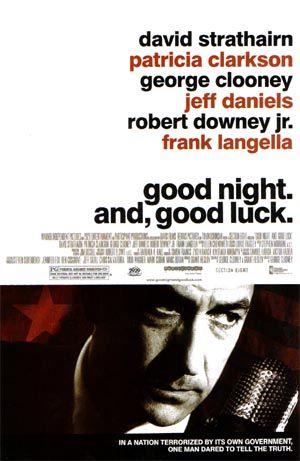 You should have been there. It was a press conference the day before his excellent new film, Good Night, and Good Luck opened the New York Film Festival. He was so handsome. And the things he said! Look, Clooney claims that he wouldn’t run for office, but after this press conference, I would vote for him, and I am not joking.
You should have been there. It was a press conference the day before his excellent new film, Good Night, and Good Luck opened the New York Film Festival. He was so handsome. And the things he said! Look, Clooney claims that he wouldn’t run for office, but after this press conference, I would vote for him, and I am not joking.
The film is great, by the way – just a wonderful and smart little movie with a lot of modern relevance. I’ll try to get my review together soon – life has been nipping at my heels. But in the meantime, bask in the smarts of George Clooney. Oh, and a couple of comments from his co-writer, co-producer and partner, Grant Heslov.
Q: So Patricia and David touched a little bit, about Brian Williams saying that there could never be a Murrow now. But Williams was on the Daily Show saying that he doesn’t give opinion. Is the closest we could get to a Murrow now someone like Jon Stewart?
Clooney: Could be. I thought Brian Williams is really articulate and really smart, actually. I think he’s the best of the guys I’ve seen so far, especially on Jon Stewart I thought he was smart because he answered some funny questions and then he avoided answering the ones that get him in dodge. I think the difference is there’s still Bill Moyers, there’s still great reporting going on by a bunch of people. The problem is that I don’t think that anybody who’s going to be forty million people watching them again. I mean honestly, I think that’s the difference. It may be good that there won’t ever be the most trusted man in America again, depending on who that man is but I just don’t think you could have that kind of access. I don’t think they’d get that many people to watch it, to change policy. You know the two great moments is Murrow taking out McCarthy and its Cronkite coming back from Vietnam and saying it’s a stalemate.
Q: We can’t win the war.
Clooney: We can’t win the war and ultimately Johnson not running again because he said ‘Hey, you know, I’ve lost Cronkite, I’ve lost the country.’ We had a great night last night, I don’t know if you guys heard about that. It was really something. Walter got up and gave a great speech. It was fun to be around a lot of old news men. It was interesting because there was a lot of, you know, Bill O’Reilly was there, and Les Moonves, who’s a friend, and then Jeff Zucker. There was enough electricity in the room but people sort of looking around for who to talk to and what to talk about. It was a really interesting night all the way around.
Q: Was this a movie for your father?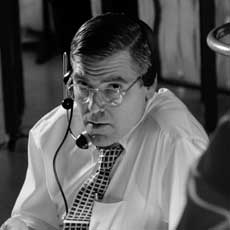 Clooney: It started, obviously, because I grew up on the newsroom floor watching my dad work with reporters like Deborah Dickson in Cincinnati, Ohio and Howard Aine and these really wonderful reporters, watching them piece a news show together. So sure, and Murrow was always the high water mark that everyone aims for. So it was my love of that, it was certainly a tip of my hat to my dad and the sacrifices he’s made over the years.
Clooney: It started, obviously, because I grew up on the newsroom floor watching my dad work with reporters like Deborah Dickson in Cincinnati, Ohio and Howard Aine and these really wonderful reporters, watching them piece a news show together. So sure, and Murrow was always the high water mark that everyone aims for. So it was my love of that, it was certainly a tip of my hat to my dad and the sacrifices he’s made over the years.
Q: Is there anyone else, journalistically, you hold in high regard now.
Clooney: I think there are a lot of great journalists out there. I don’t find much fault in the journalist in general; I think everybody would like to break a good story. I think the problem is the same problem Murrow fought in 1954 that my father fought in 1974, which is a continuous diligent fight which is the idea, and it’s not as simple answer. Les Moonves is a buddy of mine, I understand his problems of saying ‘Listen, I got to back to shareholders and I got to deliver and the market is getting smaller, money is getting less.’ I understand all those problems but it has always been and it will always be the battle between corporate and information. It’s a tricky one and it’s complicated and I don’t know if there are great answers to it.
Q: Along the way how much did you seek your father’s input in this?
Clooney: He just said the one thing to me constantly that was important, which we talked about a lot, Grant and I we weren’t doing it, which is he just said treat it like a journalist and double check, double source every scene. So that when the people that want to marginalize it – and they are out there – not marginalize, I mean they can marginalize the film all they want but we wanted strictly say that each scene happened. It’s important to say that because there’s sort of a revisionist history going on that McCarthy was right and Murrow was a traitor. Page Six actually wrote a nice story about that and Ann Coulter has a lovely book about Murrow getting the story wrong. It was important to recalibrate fact, purely fact, and that’s all. So my dad said ‘get the facts right’ and that was what was most important to us.
Q: Speaking of the facts being right, one of the great things about the film is that it doesn’t really end on some kind of rousing note. Was there a point where you thought you had to go big at the end or have something large happen?
Heslov: There was an alternate ending.
Clooney: There was a musical number.
Heslov: But not for the reasons that I think you’re asking. We had an alternative ending that wasn’t big for big’s sake. It had meaning to us. But at the end of the day we felt the film up to that point did exactly what we set out to do and we didn’t want to push it any farther.
Clooney: We had basically made a montage of some of the greatest hits of television moments and then they sort of rapidly decline to the the OJ chase. There’s man landing on the moon, John John’s salute, the OJ chase.. and it ended with that famous piece of, it was KTLA and KNBC both, one where they took of a kid’s show to do it. It was a car chase, they follow the guy and he sets his truck on fire and takes off all his clothes and blows his head off on live television. You hear the people in the background laughing in the newsroom and the guy says ‘There’s your lead news story.’ We freeze framed just before he did it.
It was really a compelling ending but it was editorializing on my part and in order to get your facts straight and do it fair, or be fair with the piece and not stand on a soapbox, we decided we had to keep it in historical context and not do that. It’s very tempting to do it because it’s it’s pretty explosive stuff to watch, and we did it, we edited it, we looked at it a bunch and we really liked it and then ultimately Grant and I sat in a room for a day and said we were going to cut our favorite scene. It’s the right thing to do, it’s the right thing to stay away from, I think, because we’re not trying to tell people how to think, we’re just bringing up a factual piece and raising a debate.
Q: As one of Hollywood’s most outspoken liberals, is it plausible to think George Clooney will one day be running for elected office?
Clooney: That’s a ridiculous idea. I think I should run on the "yes I did it" ticket. It starts with “And I drank the bong water.”
Q: The film is ostensibly about Edward R Murrow, but with the bookend pieces it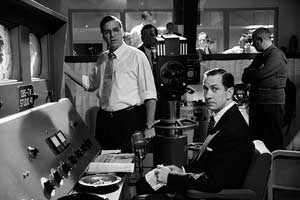 becomes also about what television could and should be.
becomes also about what television could and should be.
Clooney: We thought it was two-fold in a way. The two main reasons for doing it were – it’s not just the state of television today because it’s been a fight that’s gone on forever, but it is certainly the responsibility of the Fourth Estate to constantly question power, no matter who’s in power.
My father went after Carter with the OPEC nations raising the price of gas and he went after Gerald Ford for pardoning Nixon. It was his job. He believed that authority or government unchallenged or unquestioned, corrupt, and we’ve proven that over a long period of time, that it’s not unpatriotic to ask these questions. The other thing we thought was important to talk about was the dangers of allowing fear to erode away civil liberties because that’s always a dangerous step. We do it once every thirty years or so, we panic. We get blown up, Pearl Harbor, they bomb us and we grab up all the Japanese-Americans and throw them in detention camps. The good news about it and why it’s an optimistic film is we fix it; we’re good at that. We lose our minds, we get a little crazy, we get a little scared, usually someone capitalizes on that for their own gain and then we fix it which I like. The reason we fix it is because of newsmen. Newsman are the ones who – without them we don’t have a civil rights movement, we don’t have a women’s movement, we don’t have a Vietnam movement. Its newsmen, so that’s why we give them the support they talk about.
Q: Actors in your position don’t tend to direct all that often. Is it because it’s monetary?
Clooney: I direct one when I can. We did this TV show, Unscripted. Grant directed five, I directed five of those. They’re really fun to do too and we couldn’t have done this film had we not done that show. We learned a lot about overlapping dialogue and some of the tricks we were going to use later, and improvisation and where we wanted to put the camera. Realistically it’s about finding the script I had some interest in, or writing the script I had some interest in. But this is a subject matter I know pretty well, I mean it’s a big part of my life; grant it I researched the hell out of it too. So far I’ve done two films that have basically been about television because I know that world. Working backward I started with the low point in television and now I’ve done the high point, so I think radio next.
Q: You said no to politics but what about journalism? You seem passionate about it; your father’s got the background. Any interest in going into journalism?
Clooney: No, I don’t have the talent for it. I tried it when I was young. My dad’s one of the best I’ve ever seen. There are people who do this really well and ask the right questions and are fearless. My dad cornered Les Moon last night and I’m like ‘C’mon, take it easy, will ya?’
Q: What did he ask him?
Clooney: I think probably about the article about making it the naked news and stuff like that. There were a lot of Dan Rathers and Morley Safers there that were a little concerned with that, which you can imagine. And my dad had a couple, which we do in my family and then wandered over the Les’ table and I was a little concerned.
Q: While doing your research, did you come across information that was enlightening or new?
Heslov: We came upon tons of stuff we didn’t know. And we spent lots of time with Joe and Shirley Wershba, so a lot of the more personal stuff is their story. The fact that they couldn’t tell anybody they were married, we didn’t know that until we met them.
Clooney: In doing the research you learned it was important for us to go back to the original material. For instance, Point of Order, which some of you may know, which is the documentary that was made about the army-McCarthy hearings, if we just used that as our source of the army-McCarthy hearings, the problem is – and I’m an old liberal, it’s really unbelievably manipulatively bad, BAD. I mean, they have that scene where McCarthy is screaming, and they cut to this wide shot of him, and it looks like Frederick March at the end of Inherit the Wind. And when we got to the archival footage and watched all the archival footage, Grant called me up and said you’re not going to believe this, and it was two different days.
So the problem is, our job was, is to make sure that we went back to all of the source materials from the very beginning so that we weren’t going to compound any sort of myth that had been made in an editing room. So that was our job and it made it more complicated because we thought we could just use the source material that we had, and so we found ourselves having to check everything.
Q: Can you talk about the parallel in the end where McCarthy censured in the Senate and basically Murrow is censored…?
Clooney: I think there is very little doubt of the idea that it was the clash of those two at the pinnacle of their careers, the both of them, and it basically ended both of their career in many ways. It put Murrow in the tenuous position with Paley that got worse and certainly got bad after that ’58 speech where they didn’t speak again, and it opened McCarthy up for a 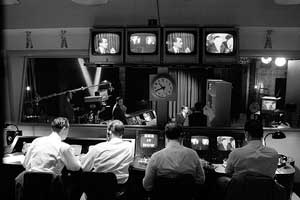 real shot at the Army-McCarthy hearings. It was the first time television a news room – Al Sops, Herb Block, Jack Gould, newspapers had written about it but television hadn’t, they’d been very timid.
real shot at the Army-McCarthy hearings. It was the first time television a news room – Al Sops, Herb Block, Jack Gould, newspapers had written about it but television hadn’t, they’d been very timid.
So it’s exactly what you say. It was one of those moments where you look around and you go, they did it the same way, they didn’t fire either of them. They just sort of let them whither on the vine until they left.
Q: It was a sad ending for both.
Clooney: I think so. It’s usually sad endings at the end.
Q: Is the film an indictment of the Patriot Act?
Clooney: Not an indictment. It is a debate of it. We’re about to have this new vote, I don’t know which one you’ve read, if you’ve read the House or the Senate one. The House one is terrifying. But I think that with any luck we’re at a place now in our country where it isn’t ‘My country right or wrong,’ and people will have honest discussions about whether or not you want to give away certain civil liberties in the pursuit of saving the state. I think it’s an important debate to have. I don’t have the answers for it but I think it’s an important debate to be talking about.
Q: Why did you both choose your respective characters?
Heslov: I chose my character because we couldn’t find anybody else to play him. Because it was easy for me to do it. We never really knew if that character would work so I could suit up and go into that scene if I had to. But for George it was a whole different kettle of fish.
Clooney: Well I didn’t really want to act in the film. It isn’t fun directing yourself you know. ‘How was I?’ ‘Fantastic.’ ‘I think you look younger!’ ‘Thank you!’
It’s not fun but it was a black and white movie starring David Strathairn for seven and a half million dollars so they were going to make sure I was in it in one way or another. Fred, for those of you who knew him or know of him, he really took over a room. He was bombastic and I decided early on that that can’t be the nature of this character this was about the story and about these words. So I took it just because I thought it’s a big enough part that I can help get the money and I have a sense as the director of how little of Fred I wanted it to be. I wanted there to be a relationship between the guys, I wanted there to be the camaraderie, I wanted there to be some of the fun, I wanted there to be the drive, but I don’t want him to take over a room. As an actor I’m most proud of the fact that I’m in those scenes and you never look at me. Because I’d really enjoy looking at me.
Q: You have a number of important, serious films now, including this, The Good German and Syriana. Does this put frothy things on the back burner?
Clooney: I like frothy things. Those are the things that bought me a nice house in Italy. And by the way, I like those frothy things. I think if my sell-out, like Murrow had to do Person to Person, if my sell-out is Ocean’s Eleven then I’m doing okay. If it’s Batman and Robin I’m in a little trouble.
Q: Why did you decide to use real footage of McCarthy?
Heslov: There were a couple of things. One, we wanted to use McCarthy’s own words, in much the way Murrow did in his show. We thought that would be, in the end, most effective. We also talked a lot about who we would get to play McCarthy if we actually cast somebody. The more we talked about it the more we realized nobody would be believable. Anybody who played the role as we had written it, you would think they were over the top and going overboard, and then we would get nailed for that. At the end of the day we decided to just use the real footage.
Clooney: It was much cheaper. We also decided to take out an ad, ‘For your consideration: Best Supporting Actor, George McCarthy,’ in the trades.
Q: What was the process of choosing the cast, like David?
Clooney: He’s the only guy we ever thought of.
Q: Weren’t you planning on playing Murrow at one point?
Clooney: I’m the only guy I ever thought of.
Q: But the rest of the ensemble as well.
Clooney: Well Frank [Langella] I’d worked with several times, including on Unscripted. I knew that David is going to hold his own and is going to have the screen for so long that you needed someone that can walk into a scene and do three scenes and hold their own with someone who’s going to be as powerful as David. Frank can do that. We helped it too by, I made the sets bigger to Murrow look smaller in all the Paley stuff so when he sits there we wanted to find a place to make him look smaller. But, Frank’s good. Frank Langella, he’s the real deal so that when he sits there and looks at him, it’s real clash of titans and I think that that worked well.
Patty, Robert, I thought Ray Wise just did a wonderful job. Jeff Daniels is fantastic. So basically we got everybody we asked for, you know, Patty, I called David first. Grant and I were in Italy, we called him up, he said ‘Yeah I’m in,’ we did it. The second person we called was Patty. We said ‘Listen, you want to do this?’ she says ‘Alright, I’ll do it.’ And then it was just sort of one after the other just called up and said they’re in. We were really lucky that way. The guys we know a little bit, a lot of them were in Memphis Belle together, which is funny. But there’s a great familiarity between them and that helps.
And in the mornings, they would come in, we had a real news room set up with their own type-writers and their own desks, and every morning you come and say ‘OK, today is October 4th, 1954,’ and they had a New York Times and a New York Post and Washington Post of that day with all the ads and everything. And they would sit their with their little manual type-writers and they would go through the papers and they would pick their stories and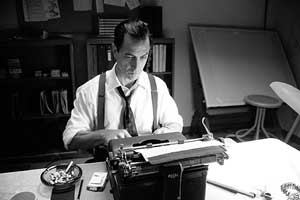 then we would go in the room after a couple hours when we were ready to start with the cameras set, and we’d have two cameras going, and they’d start rolling and I’d go "”OK, what’s your lead" and they would pitch their stories and we did it the way I watched my dad put together a news program every night. And that had an entity to it that I really loved and it reminded me of the things I grew up watching in news.
then we would go in the room after a couple hours when we were ready to start with the cameras set, and we’d have two cameras going, and they’d start rolling and I’d go "”OK, what’s your lead" and they would pitch their stories and we did it the way I watched my dad put together a news program every night. And that had an entity to it that I really loved and it reminded me of the things I grew up watching in news.
It’s a funny how these guys will take on these characters. You know, Matt’s trying to pitch sort of, it’s like with my dad you’d be pitching metro stories which just never are going to make it to the front. ‘I think it should be the lead!’ No, metro.
Q: Did you see Medium Cool when it came out?
Clooney: Sure I saw Medium Cool when it came out.
Q: Think it had an influence?
Clooney: No, I mean, yeah, of course, in a way, but not a direct influence. I focused on documentaries, Pennebaker documentaries; Crisis and Primary and documentaries like that because I thought, unlike the first film that I did where the camera was a character, I wanted this to be a film where the camera was long lens and way back and were not part of. I am just talking about camera but thematically those felt like the way to – that these words were so important that you wanted to capture them and not try to comment on them with a camera so I thought Medium Cool was very good at doing that.
Q: Is your film political?
Clooney: It isn’t overtly political. It is a film by someone who happens to political but it’s a historical piece. We were very careful with our facts to make sure of that. If that opens up a debate of any sort of political or journalistic questions then good, and if it doesn’t, then that’s okay, we did our job. If some kid in Cincinnati sees it in a journalism class and decides he wants to be a writer because of it, and he wants to hold certain standards, then we win.
Q: Murrow talks about, a couple times in this film, not only should television entertain but also should illuminate. Is there an obligation for movies to do that also?
Clooney: Yeah of course they do. They tend to reflect the times. You hope that at some, it’s like protest songs of the sixties. It takes a while for everybody to catch up and then it sort of catches up. I think that films in general go through periods of time where we don’t really care much about political or social issues. I think then when political and social issues become the forefront, it takes a couple years to write the script and get the film out so it’s usually a little later. But I think that there’s room for both entertainment and certainly films that can, you know – Guess Who’s Coming to Dinner, is a pretty good one when you think of it was in the middle of a civil right’s movement, and Best Years of our Lives coming home from the war, and Young Lions and taking on Germans not all being evil.
I think there are plenty of films over a history of time that have done some questions. I’ve got on coming out, Syriana, that’s going to get me plenty of trouble. Makes this look like a Capra film.
Q: it’s also a buddy movie in a way, what do you like about buddy movies?
Clooney: I like ensembles, not just buddy movies, I really like ensembles. ER was an ensemble. I’ve had all my successes out of ensembles. And quite honestly I like working with people that are friends. It’s fun. I have a fun sets with fun places to be I think it’s healthy and good work comes out of it. And so you get a list of the group of people you like to work with and try to work with them as often as possible. It seems like it’s a good thing to do. Steven [Soderbergh] and I have the same policy.
Q: The current state of journalism, if you believe what you read in the magazines and newspapers, and television, is all celebrity culture.
Clooney: But don’t you think that that’s not new? In reality it has always been. There has always been, part of that is a driving element. I saw some real teeth in journalism in Katrina; again, I think we go up and down with that. You know there was a tremendous amount of celebrity journalism before 9/11 and then it seemed to stop and suddenly there were some real conversations going on. I think it’s cyclical again. I’m not one to attack it since my father’s been one for a long time and I find that if I’m going to do movies that are fluff at times to help get real news out… if sending Brad Pitt to Africa gets 18 million people to understand more about the plight of how dangerous Mugabe is, well then that’s part of the trade-off and I think that’s okay.
Q: But it must get frustrating when you have to read you’re living with some girl or you’re hosting a wedding.
Clooney: But that would be my own sort of personal issues. In a way, you have to think on a much grander scale. For instance, I’ll give you the best way of understanding that. It’s a real pain in the ass to have a bunch of photographers hanging outside your house. I know it sounds like you don’t want to hear people complain, I’m not complaining. I’m just saying it’s a rotten thing. If you did it for a day you’d go ‘This isn’t very fun.’ They’re sneaky, the pop out of places to take pictures. They don’t necessarily try to catch you doing something stupid, they create you doing something stupid by picking fights. Okay. But I must forever defend their right to be there because the idea of stopping them is so much more dangerous in that first step towards censorship. 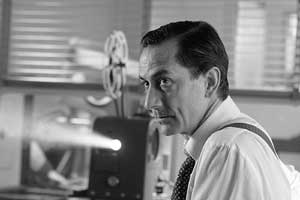 It’s like burning the first book even if it’s Mein Kampf, to me those are the things we have to eat if we’re public figures, if we’re well known. As a part of the thing you go ‘It’s a drag,’ but to try to take steps to stop them – now that doesn’t mean, if they’re committing a crime that’s another thing, but in general, celebrity journalism and all those things, those are things you sort of have to take at the risk of any way of trying to stop it. Because stopping it to me is censorship.
It’s like burning the first book even if it’s Mein Kampf, to me those are the things we have to eat if we’re public figures, if we’re well known. As a part of the thing you go ‘It’s a drag,’ but to try to take steps to stop them – now that doesn’t mean, if they’re committing a crime that’s another thing, but in general, celebrity journalism and all those things, those are things you sort of have to take at the risk of any way of trying to stop it. Because stopping it to me is censorship.
Q: How was growing up in conservative Cincinnati how did that affect you or illuminate you in one way or another?
Clooney: It wasn’t so conservative then. But it was different time. When I was growing up, it was early 70’s and it was the sexual revolution and the drug counterculture and the civil right’s movement and the women’s rights movement. Even in Cincinnati they had giant lapels and big thick ties and wild hair. It wasn’t so conservative growing up with the exception of a few. It’s much more conservative now.
We had a mayor; you know Jerry Springer was the mayor for a while. I got to tell you something funny about that idiot is that he was a friend of ours. He was sort of this Kennedy Democrat. He was really sharp, he was really articulate. I really liked him, you know. My dad gave him his first broadcasting job on the news and I liked him. And then he wrote a check to a hooker. Now that’s dumb. And he came out in sort of a Kennedy way and said ‘What I just did, that was dumb and I quit.’ And he quit and he ran again and he won by a landslide. I was like ‘This guy’s fantastic.’ And then he got into that show and slowly that show changed and he changed. I saw him not too long ago, and he’s like ‘George come on, say hi,’ and I said ‘I’m ashamed of you, my father’s ashamed of you, we’re ashamed of what you’ve done and ashamed of what you do. You, more than anyone, know what you’re doing.’ There are people, there are the Jenny Jones’ of the world who think they’re actually performing some sort of public service. Okay well, but he knows better and that to me is shameful.
Q: Are you going to be campaigning in Ohio with the democrats?
Clooney: I don’t campaign. I’ve found that campaigning – you know, I didn’t campaign for my father. I did some fundraisers for him but I didn’t campaign for him because it’s Hollywood versus the Heartland.
I think actors in general, right now, marginalize the people that they are supporting and I don’t think it’s helpful. I will do fundraisers and sort of do whatever I can behind the scenes. I’m not out to hurt a candidate. Kerry called me and was like ‘Hop on the train, we’re going to take a train ride,’ and I thought I would do more harm than good so why to do that.
Q:Did Bill O’Reilly have an opinion on your film?
Clooney: He said it was fair so we’ll see.
Q: If you could interview anyone, dead or alive, who would it be?
Clooney: That’s
a good one. You know, just because he
was funny too, Jack Kennedy would have been fun. If you would have watched his press conference right after the
Bay of Pigs, amazing. The first act as
president and it’s the Bay of Pigs.
You know, it’s not the best. He comes out and he comes out like this ‘What
happened yesterday was my fault and I take full responsibility,’ and the whole
press corps is sitting there. And the
first question is ‘Isn’t it your fault?’
And he says ‘I just said that.’
And then they all just kind of sat there for a minute and then you hear ‘What’s
Jackie going to wear tomorrow?’ He was
funny, that wuold have been a fun one.
Q: Do you think your politics would keep people from casting you in movies? I was thinking Da Vinci Code, the role written with you in mind.
Clooney: Well it is Ron Howard directing and its Tom Hanks so I figure I understand losing out that one. Listen, remember, I don’t hold press conferences about my political view. I’ll do an interview and if somebody asks me I’ll answer them because I think that’s my right but I’m not out there trying to force people to believe what I believe, and it hasn’t harmed me so far. Bill O’Reilly did a half-an-hour show about why my career was over because of my political views with some producer I’ve never seen before who said she’s never hire me. I have no idea who she is but I’m not worried about that. Listen, if it all goes away tomorrow, I can sell my house and live in a nice apartment so I’m doing fine.
Cast your vote for Clooney on our message board!